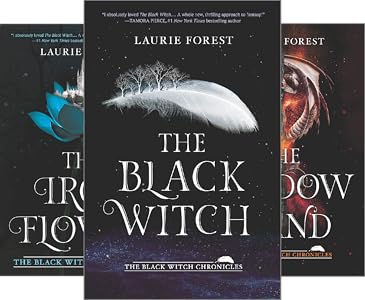
![]() The Iron Flower by Laurie Forest
The Iron Flower by Laurie Forest
When Laurie Forest’s debut YA fantasy novel The Black Witch was published in 2017, there was a massive explosion of outrage in the Twitterverse and elsewhere online. Accusations of various types of prejudice — racism (albeit based on fantasy races), homophobia, white saviorism, ableism, lookism and more — were hurled against it. In my opinion those charges were unfair and based on a superficial reading of the text, missing the fact that the main character’s prejudices were clearly being shown as unthinking bias and bigotry, and in fact she does very gradually change her thinking over the course of the book. Still, I’m sure it was stressful for the author, so my assumption going into this sequel was that Forest likely probably worked overtime to make sure The Iron Flower (2018) wouldn’t offend anyone. It will come as no surprise to anyone that this assumption was correct. Unfortunately, what remains after the controversial elements have been removed is a run-of-the-mill romantic fantasy.
As The Iron Flower begins, Elloren Gardner and her friends at the University in the country of Verpacia have joined the Resistance, an underground group that seeks to undermine the Gardnerian conquest of neighboring lands and their violent bigotry toward other races. Elloren is one of the privileged Gardnerians, but with one brother who’s gay (forbidden sexual orientation!) and another who’s fallen in love with a werewolf (forbidden mixing of races!), and a set of friends that includes numerous other races, she’s now fully committed to battling Gardnerian oppression in all its forms.
It doesn’t hurt that Elloren is also falling in love with (or at least crushing hard on) Yvan, a Keltic young man who alternates between gazing at Elloren longingly and pushing her away for reasons he refuses to divulge. At the same time, Elloren is still having mixed feelings about Lukas Grey, the hot Gardnerian military commander that her powerful Aunt Vyvian has been pushing her to wandfast with (the Gardnerian version of marriage). Elloran has never had any magical power, but Lukas is certain that locked within her is the tremendous power of the Black Witch of prophecy.
 The first half of The Iron Flower is slowish and muddled and I kept bogging down and setting it aside. Every moment that Elloren isn’t being OUTRAGED by the social injustices of her society, she’s obsessing about her feelings for Yvan or dithering about (and kissing) Lukas. Lukas is aware of Elloren’s rebellious leanings but still wants her, even though he “doesn’t believe in love.” Also, unless you remember all of the secondary and minor characters from The Black Witch, you’re going to find the large cast of characters confusing.
The first half of The Iron Flower is slowish and muddled and I kept bogging down and setting it aside. Every moment that Elloren isn’t being OUTRAGED by the social injustices of her society, she’s obsessing about her feelings for Yvan or dithering about (and kissing) Lukas. Lukas is aware of Elloren’s rebellious leanings but still wants her, even though he “doesn’t believe in love.” Also, unless you remember all of the secondary and minor characters from The Black Witch, you’re going to find the large cast of characters confusing.
In the second half of the book, the plot finally snaps into focus and things get more interesting. The most intriguing character by far was Lukas, who turns out to have some unanticipated depths. However, the ending is, if not exactly a cliffhanger, very much just a mid-story stopping place, with the overarching plot left unresolved. More problematic, Forest’s writing style is basic and she uses first person present tense narration, which tends to come across as amateurish in less-skilled hands.
If you were an enthusiastic fan of The Black Witch, then you’ll likely enjoy The Iron Flower, though you may need to push yourself through the slower-paced first half. If you despised The Black Witch because Elloren was prejudiced in so very many ways, you can at least rest assured that she’s now fully woke.



It sounds like she’s struggling to find her story. The compass points of the two love-interest guys sounds like a romance novel configuration. I wonder how she’d do if she just embraced those tropes and went for a flat-out romance story. I mean, those tropes work.
I think she’s trying to balance the love triangle (which is pretty gushy in that YA kind of way) with the more serious part of the plot. Which is fine, but it’s been done so many times before, and far better.